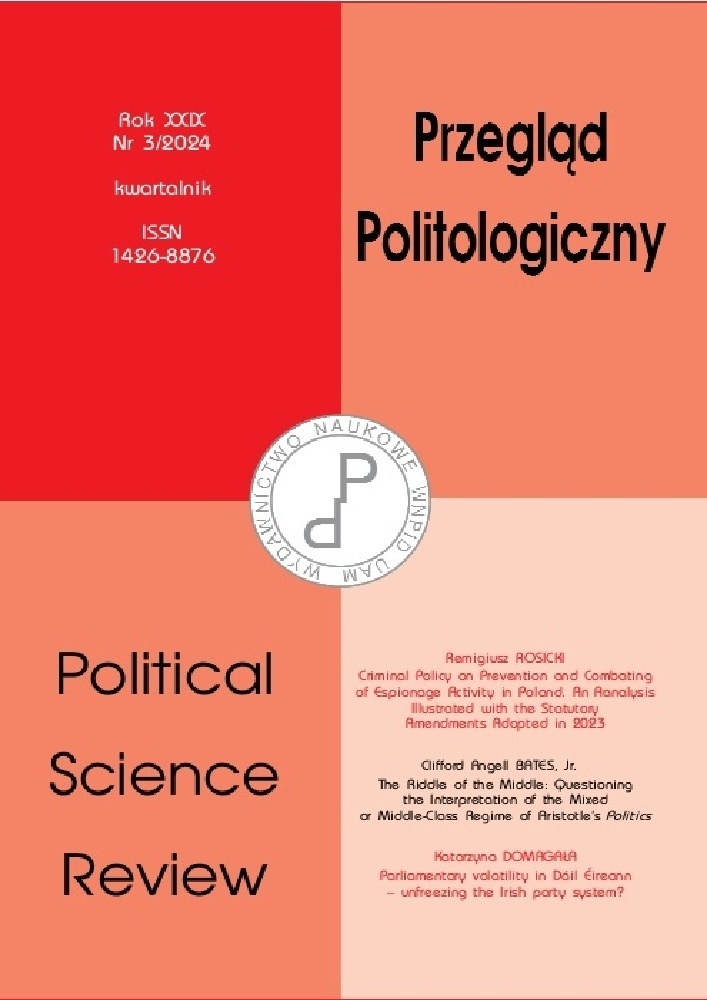Abstrakt
Niniejszy artykuł kwestionuje argument, że reżim klasy średniej jest ucieleśnieniem reżimu mieszanego i jest przedstawiany jako najlepszy reżim w praktyce lub najlepszy reżim w większości miast. Zamiast opisu najlepszego praktycznego reżimu, to znaczy konkretnej formy reżimu, Arystoteles przedstawia opis tego, w jaki sposób reżimy mogą osiągnąć umiarkowanie i harmonię – to znaczy stabilność poprzez zapewnienie roli mezo, środka, który znajduje się pomiędzy bogatymi i biednymi. Arystoteles w swoim opisie tego środka i jego wyższości nad bogatymi i biednymi, poruszamy się po znaczeniu tego, czym naprawdę jest element środkowy. Tak więc zamiast opisu konkretnego typu reżimu otrzymujemy opis tego, co ogólnie rzecz biorąc łagodzi i stabilizuje reżimy.
Bibliografia
Adamovsky E. (2005), Aristotle, Diderot, Liberalism and the Idea of ‘Middle Class’: A Comparison of Two Contexts of Emergence of a Metaphorical Formation, “History of Political Thought”, 26(2), pp. 303–333.
Biondi C.-A. (2007), Aristotle on the mixed constitution and its relevance for American political thought, “Social Philosophy and Policy”, 24(2), pp. 176–98. DOI: https://doi.org/10.1017/S0265052507070215
Bluhm W. (1962), The Place of ‘Polity’ in Aristotle’s Theory of the Ideal State, “The Journal of Politics”, 24(4), pp. 743–753. DOI: https://doi.org/10.1017/S0022381600016224
Blythe J. M. (1992), Ideal Government and The Mixed Constitution in the Middle Ages, Princeton University Press, Princeton. DOI: https://doi.org/10.1515/9781400862603
Bookman J. T. (1992), The Wisdom of the Many: An Analysis of the Arguments of Book III and IV of Aristotle’s Politics, “History of Political Thought”, 13(1), pp. 1–12.
Cammack D. (2013), Aristotle on the Virtue of the Multitude, “Political Theory”, 41(2), pp. 175–202. DOI: https://doi.org/10.1177/0090591712470423
Cherry K. M. (2009), The Problem of Polity: Political Participation and Aristotle’s Best Regime, “The Journal of Politics”, 71(4), pp. 1406–1421. DOI: https://doi.org/10.1017/S002238160999003X
Cherry K. M. (2015), Aristotle’s ‘Certain Kind of Multitude’, “Political Theory”, 43(2), pp. 185–207. DOI: https://doi.org/10.1177/0090591714544326
Chuska J. (2000), Aristotle’s Best Regime: A Reading of Aristotle’s Politics, VII. 1-10, University Press of America, Lanham, MD.
Clifford B. A. Jr. (2003), Aristotle’s Best Regime, LSU Press, Baton Rouge.
Clifford B. A. Jr. (2014), The Centrality of Politeia for Aristotle’s Politics: Aristotle’s continuing significance for social and political science, “Social Science Information”, 53(1), pp. 139–59. DOI: https://doi.org/10.1177/0539018413510364
Coby P. (1988), Aristotle’s Three Cities and the Problem of Factions, “Journal of Politics”, 50(4), pp. 896–919. DOI: https://doi.org/10.2307/2131384
Coby P. (1986), Aristotle’s Four Concepts of Politics, “Western Political Science Quarterly”, 39(3), pp. 480–503. DOI: https://doi.org/10.1177/106591298603900309
Davis M. (1996), The Politics of Philosophy: A Commentary On Aristotle’s Politics, Roman and Littlefield, Savage–Maryland.
de Alvarez L. P. S. (1988), The Constitution and American Character: The Framers’ Views, in: Constitutionalism in Perspective, ed. S. B. Thurow, University Press of America, Lanham, MD, pp. 255–276.
Diamond M. (1978), The Separation of Powers and the Mixed Regime, “Publius”, 8(3), pp. 33–43. DOI: https://doi.org/10.2307/3329708
Easterly W. (2001), The Middle Class Consensus and Economic Development, “Journal of Economic Growth”, 6(4), pp. 317–335. DOI: https://doi.org/10.1023/A:1012786330095
Fukuyama F. (2011), The Origins of Political Order, Farrar, Straus and Giroux, New York, NY.
Fukuyama F. (2012), Future of History: Can Liberal Democracy Survive the Decline of the Middle Class, “Foreign Affairs”, 91(1), pp. 53–61.
Hobbes T. (1991) [1651], Leviathan, ed., R. Tuck, Cambridge University Press, Cambridge.
Johnson C. (1988), Aristotle’s Polity: Mixed or Middle Constitution?, “History of Political Thought” 9(2), pp. 189–204.
Kraut R. (1997), Aristotle: Politics VII and VIII, Clarendon Press, Oxford. DOI: https://doi.org/10.1093/oseo/instance.00259313
Kronman A. (1979), Aristotle’s Idea of Political Fraternity, “American Journal of Jurisprudence”, 24, pp. 114–138. DOI: https://doi.org/10.1093/ajj/24.1.114
Lipset S. M. (1959), Some Social Requisites of Democracy: Economic Development and Political Legitimacy, “American Political Science Review”, 53(1), pp. 69–105. DOI: https://doi.org/10.2307/1951731
Lipset S. M. (1994), The Social Requisites of Democracy Revisited: 1993 Presidential Address, “American Sociological Review”, 59(1), pp. 1–22. DOI: https://doi.org/10.2307/2096130
Lockwood T. C. Jr. (2006), Polity, political justice and political mixing, “History of Political Thought”, 27(2), pp. 207–222.
Lord C. (1987), Aristotle, in: History of Political Philosophy, 3rd ed., eds. L. Strauss, J. Cropsey, University of Chicago Press, Chicago, pp. 118–154.
Lord C. (2013), The Politics of Aristotle, 2nd ed., University of Chicago Press, Chicago.
Lord C., O’Connor D. (eds.) (1991), Essays on the Foundations of Aristotelian Political Science, University of California Press, Berkeley. DOI: https://doi.org/10.1525/9780520323513
Montesquieu C. (1989), Montesquieu: The spirit of the laws, Cambridge University Press, Cambridge.
Mulgan R. G. (1977), Aristotle’s Political Theory, Claredon Press, Oxford.
Newman W. L. (ed.) (1973), The Politics of Aristotle, 4 vols, Arno Press, New York.
Nichols M. P. (1991), Citizens and Statesmen. Savage, Roman and Littlefield, Maryland.
Ober J. (2013), Democracy’s wisdom: An Aristotelian middle way for collective judgment, “American Political Science Review”, 107(1), pp. 104–122. DOI: https://doi.org/10.1017/S0003055412000627
Robinson R. (trans & ed.) (1996) [1962], Aristotle Politics Books III and IV, Claredon Press, Oxford.
Ross W. D. (1957), Aristotleis Politica, Clarendon, Oxford. DOI: https://doi.org/10.1093/oseo/instance.00259280
Rubin L. G. (2018), America, Aristotle, and the Politics of a Middle Class, Baylor University Press.
Salkever S. G. (2007), Whose prayer? The best regime of book 7 and the lessons of Aristotle’s Politics, “Political Theory”, 35(1), pp. 29–46. DOI: https://doi.org/10.1177/0090591706295613
Sidgwick H. (1892), Aristotle’s classification of forms of government, “The Classical Review”, 6(4), pp. 141–144. DOI: https://doi.org/10.1017/S0009840X00185221
Simpson P. (1997), The Politics of Aristotle – Translation and Introduction, University of North Carolina Press, Chapel Hill.
Simpson P. (1998), A Philosophical Commentary on the Politics of Aristotle, University of North Carolina Press, Chapel Hill.
Stocker M., Langtry B. (1986), Aristotle and Polity, in: Political Thinkers, ed., D. Muschamp, St. Martin’s Press, New York, pp. 26–38. DOI: https://doi.org/10.1007/978-1-349-18183-4_3
Tocqueville A. (2000), Democracy in America, trans. H. C. Mansfield Jr., D. Winthrop, University of Chicago Press, Chicago, IL. DOI: https://doi.org/10.7208/chicago/9780226924564.001.0001
Waldron J. (1995), The Wisdom of the Multitude: Some Reflections on Book III Chapter 11 of the Politics, “Political Theory” 23(4), pp. 563–584. DOI: https://doi.org/10.1177/0090591795023004001
Yack B. (1986, 1993), Problems of a Political Animal, University of California Press, Berkeley. DOI: https://doi.org/10.1525/9780520913509
Licencja
Prawa autorskie (c) 2024 Clifford Angell Bates, Jr.

Utwór dostępny jest na licencji Creative Commons Uznanie autorstwa – Na tych samych warunkach 4.0 Miedzynarodowe.

